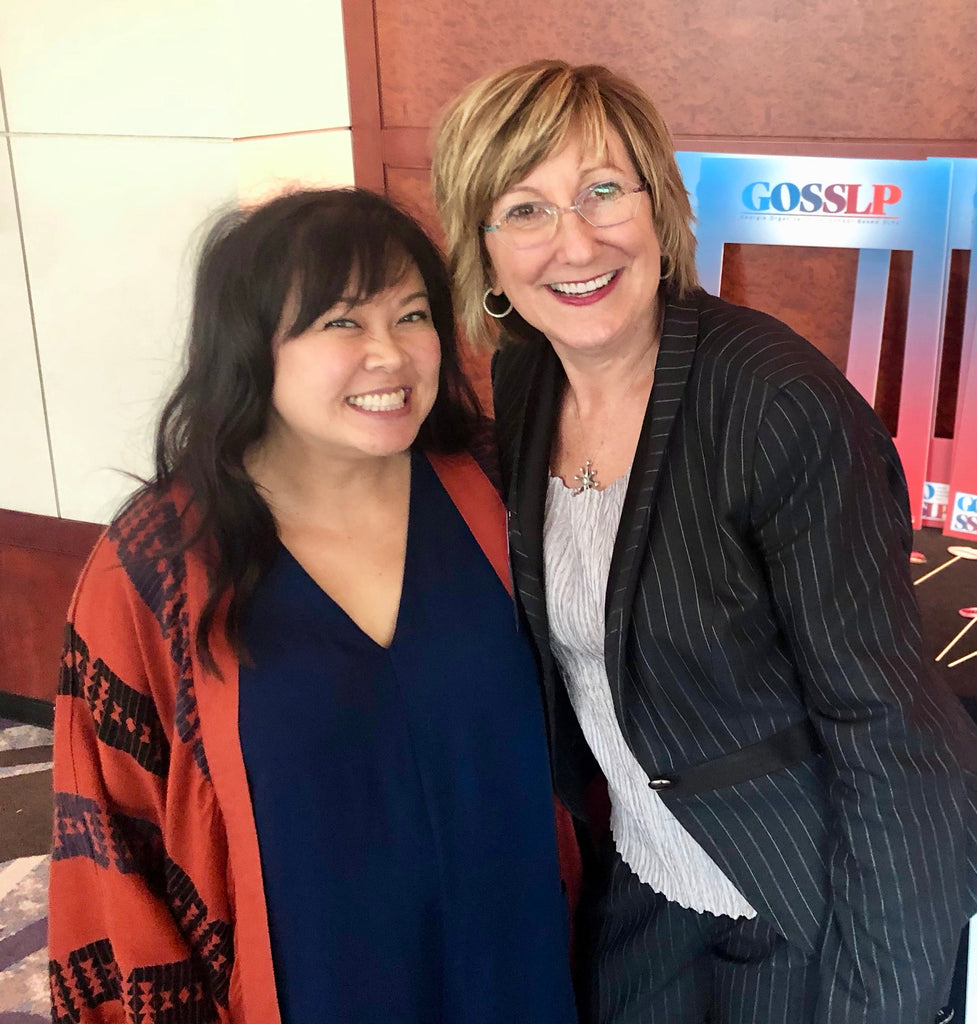We are happy to highlight some of our colleagues that inspire us and are doing marvelous things in the SLP profession.
Phuong Lien Palafox is an amazing SLP and friend of STR. Even though she has always been one of our favs, she is skyrocketing in her popularity and influence. To say it in brief, she is an ADVOCATE-extraordinaire for on-the-ground, trench-weary speech-language pathologists.
We invited her to share some of her journey and her latest works with us and with our community. Thank you, Phuong. Enjoy!

How Stuttering Gifted Me Speech-Language Pathology
We met in 1990 as sixth graders. Adolescent hormones reigned, and my peers were already talking about the "new cute boy" before he entered our first period class. Coincidentally, as he began talking, sentiments quickly changed. The new kid stuttered, and middle school is a hotbed of cruelty. Luckily, as a self-proclaimed academic zealot, I had no time for such juvenile, superfluous endeavors. So, Lance and I became friends. Our relationship granted me someone who would laughed at my jokes, a partner in consuming chips and salsa at Taco Delite and the first exposure to my profession as a speech-language pathologist. When I decided to become an SLP, he gifted me with a handmade pacing board.
I've Got Stuttering All Wrong
Stuttering got me into the world of communicative disorders. Upon entry into the vast world of speech-language pathology, stuttering would only show up intermittently. In college, I learned about stuttering modification theories to reduce dysfluency rate, physical tension, and secondary characteristics. Truth be told, with few students/clients with fluency needs on my caseload, it became an arena that brought me anxiety. I was surely not an expert in this arena, and I wasn't sure I agreed with the strategies. A part of this ache felt like I was cheating on my profession--my human heart felt "not okay" solely working on fluency. Then, my SLP world had an awakening in 2012 when I heard Nina Reeves speak at a conference. She did not just focus on (overrated and unrealistic) fluent speech. She enthusiastically sung the praises of the entire human being (!)--the feelings and attitudes (Affective); the avoidance, tension, struggle (Behavior); and thoughts, self-evaluation (Cognitive).
Stuttering Superpowers
In 2017, I was asked to cover a middle school caseload, and I met Margo*, a sixth-grader who loved the WNBA. Brittney Griner of the Phoenix Mercury was her shero...only second to her mother. She was also a person who stuttered. Her eyes rarely met another person's eyes, she did not speak in class and a whispered "I don't know" was given when asked a question. With my newfound stuttering knowledge in my SLP brain and permission to use my humanity to support the whole Margo, we got to work. Margo kept a journal with her thoughts about her stuttering. She made a "1-10" Empowerment Scale to track her feelings regarding her communication strategies. By the end-of-year, she self-advocated, initiated answering questions in class, gave herself a score of 9 on her Empowerment Level and mastered her goal of doing a presentation with a self-selected audience on her future profession.

I was excited to be invited to her chat on becoming a basketball player. As she began her PowerPoint, I quickly realized that she changed her mind. I quizzically looked at her. She easily stuttered, "I want to be a speech-language pathologist. I want to be you. I want to empower people." My heart burst as I listened to her go through her five slides for the next 45 minutes. SLP-priceless.
The Core of Being a Speech-Language Pathologist

In the last 15 years, I have been serving others--my clients, my students, my campuses. As I spend time on compliance tasks and text book strategies, I have realized that the truth in our profession is always found within the people. My SLP worth is not based on productivity. It is based on my humanity. Margo taught and confirmed this truth. Coincidentally, this is why I initially chose to be in our amazing profession. Because of the people.
The Heartbeat of Speech-Language Pathology

I understand our SLP and human needs, and I find solace in writing. So, here is The Heartbeat of Speech-Language Pathology. Focusing on the power of the connections we make with those we serve, I share my narrative, both personal and professional, to empower your daily efforts supporting individuals with communication needs.
This book will provide effective evidence-based strategies to use across professional settings, content on family-centered practice, resources for supporting our diverse populations and well-earned lessons for your career. Thank you to friends who have shared their kind words regarding this work:
"Phuong Palafox has captured lightning in The Heartbeat of Speech-Language Pathology: Changing the World One Session at a Time. I'm currently at the beginning of my 6th year working as a speech-language pathologist, and this book left me with both a boost of confidence and reassurance, while also wishing I had been able to read these words when I was first starting out." - Max J. Pell
__________________________________
Phuong Lien Palafox, MS, CCC-SLP, is a bilingual speech-language pathologist. Currently, her time is happily spent serving clients/students and supporting SLPs and educators across the United States. Her work has been featured in the American Journal of Speech-Language Pathology and publications for the American Speech-Language-Hearing Association. She specializes in service delivery models, literacy-based interventions, students from diverse backgrounds (including poverty) and social skills for children with autism. She can be reached at phuonglienpalafox@gmail.com and www.phuonglienpalafox.com.





